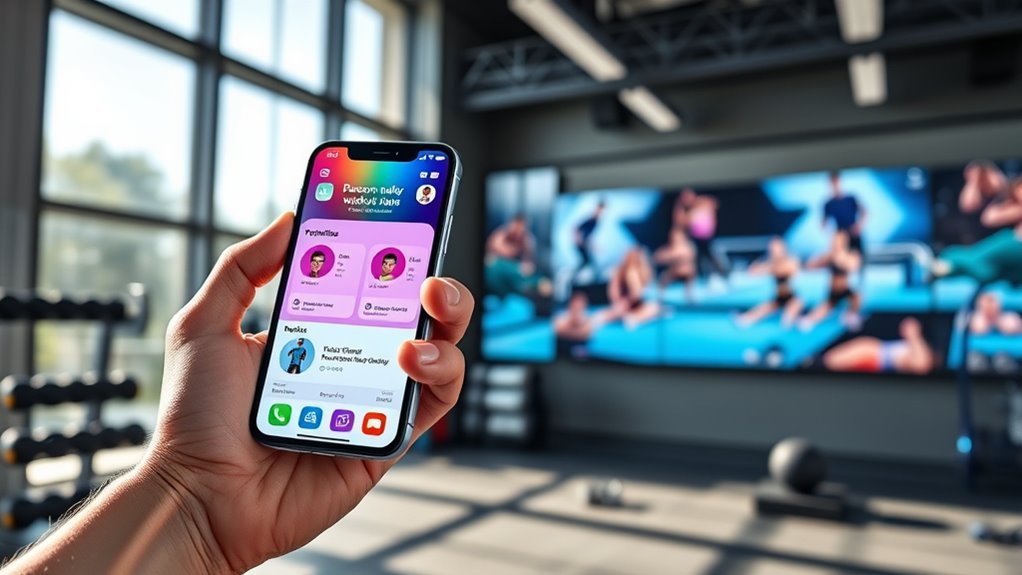AI personalizes fitness app content by tailoring workouts, nutrition, and wellness plans to your unique goals, preferences, and biological data. It adapts routines over time by analyzing real-time feedback from wearables and monitoring your progress, ensuring workouts stay challenging yet safe. With features like form correction and holistic health insights, AI creates a highly engaging experience that evolves with you. Keep exploring to discover how these advanced features can help you optimize your fitness journey.
Key Takeaways
- AI customizes workout routines based on individual age, goals, fitness levels, and preferences for tailored experiences.
- Continuous data from wearables enables real-time adjustments to optimize workout safety and effectiveness.
- Advanced algorithms adapt routines over time, considering progress and physiological changes for sustained challenge.
- Integration of genetic, health, and user data allows hyper-personalized nutrition and wellness recommendations.
- Computer vision and immersive AI features enhance form correction, virtual coaching, and interactive training experiences.

Artificial intelligence is transforming how fitness apps deliver personalized content, making workouts more effective and engaging for users. Instead of generic routines, AI customizes workout plans based on your age, fitness level, goals, and preferences. It uses algorithms that learn from your behavior over time, adapting your routines to match your progress and changing needs. This means your workout evolves as you improve, keeping you challenged without risking injury. Your sessions include tailored strength, cardio, and flexibility exercises, ensuring a balanced approach that targets all aspects of fitness. Intelligent scheduling also factors in recovery periods, helping you optimize performance while reducing the risk of overtraining or burnout. Enhanced data processing speeds enable real-time analytics, allowing the app to respond instantly to your physiological data and activity changes. The integration of AI safety measures is crucial to prevent potential risks and ensure user well-being. Additionally, personalized feedback enhances motivation by providing encouragement tailored to your achievements and challenges. Integration with wearable devices enhances this personalization further. Real-time data from your fitness tracker—such as heart rate, sleep patterns, and activity levels—allows the app to make instant adjustments during workouts. For example, if your heart rate is higher than expected, the app might suggest slowing down or taking a break. If your sleep quality drops, it could recommend lighter activities or additional recovery time. This continuous feedback loop keeps your routines aligned with your current physiological state, making each session more effective and safe. Additionally, adaptive goal setting helps keep you motivated by dynamically revising targets based on your performance, so you stay challenged without feeling overwhelmed.
AI personalizes workouts based on your goals, progress, and preferences for safer, more effective fitness routines.
Beyond just tracking your workouts, AI leverages extensive data sources like genetic information, health monitors, and user input to craft highly personalized fitness and nutrition plans. This hyper-personalization ensures that your program aligns with your unique biology and lifestyle, maximizing results and fostering consistent habits. Continuous monitoring also enables AI to identify potential health risks early, suggesting corrective exercises or adjustments to prevent injury. Smart device integration supports ongoing program refinement, providing you with real-time feedback that keeps your fitness journey on track.
Progress tracking is another crucial aspect AI handles expertly. It monitors your workout frequency, performance metrics, and physiological data to evaluate your progress extensively. The system detects improvements, plateaus, or signs of slipping adherence, prompting motivational prompts or program tweaks to keep you engaged. Nutritional advice and meal planning are integrated into your routine, helping you manage your overall health holistically. Personalized feedback loops foster a sense of support and encouragement, increasing your commitment and loyalty to the app. As machine learning algorithms become more sophisticated, they can also predict future performance trends, allowing for proactive adjustments to your training plan.
As the industry grows—projected to reach nearly $26 billion by 2030—AI-powered personalization is becoming the cornerstone of fitness apps. From real-time form correction using computer vision to virtual coaching that adapts to your biomechanics, AI creates immersive, interactive training experiences. This rapid evolution makes fitness apps not just tools for exercise but comprehensive health companions dedicated to optimizing your mental clarity, performance, and overall wellness.
Frequently Asked Questions
How Does AI Adapt Workouts for Users With Injuries?
You ask how AI adapts workouts for injured users. AI analyzes your injury details and monitors your progress to create personalized recovery plans. It adjusts exercises to match your healing stage, ensuring safe movement. Real-time feedback helps correct your form, while adaptive routines prevent overexertion. By continuously tracking your limitations and improvements, AI fine-tunes your program, making recovery efficient and safe without risking further injury.
Can AI Personalize Nutrition Advice Alongside Fitness Plans?
You wonder if AI can personalize nutrition advice alongside fitness plans. The answer is yes. AI analyzes your health data, activity levels, and goals to create tailored diet recommendations. It adjusts these suggestions in real-time using wearable device inputs and biometric info. This holistic approach helps you stay motivated, saves time, and improves results by integrating your nutrition needs with your fitness journey seamlessly.
What Privacy Measures Protect User Data in Ai-Driven Apps?
You’re wondering how user data stays protected in apps that use AI. These apps use encryption to secure data, anonymize info before sharing, and require your explicit consent. They also restrict access with strict controls and regularly audit their security. Plus, they store data securely, transmit it over safe protocols, and give you control to manage or delete your data. These measures help keep your information private and compliant with laws.
How Does AI Handle Diverse Fitness Goals Across Users?
You might wonder how AI manages different fitness goals. It collects detailed data about your specific objectives, like losing weight, building muscle, or running a marathon. Then, it analyzes your preferences, progress, and limitations to create personalized workout plans. AI continuously updates your program based on your results, ensuring your workouts stay relevant and effective. This tailored approach helps you stay motivated and reach your goals safely and efficiently.
Are There Limitations to AI Personalization for Beginners?
Imagine stepping into a gym where every machine seems tailored just for you, but as a beginner, you might find AI’s personalized routines aren’t quite that personalized. You may miss the human touch, motivation, and nuanced guidance that help you stay confident and safe. AI can struggle with understanding your emotional states or health concerns, making it less effective for beginners needing that personal connection and real-time support.
Conclusion
By leveraging AI to personalize your fitness app experience, you get workouts tailored just for you, keeping you motivated and on track. Some might think this makes the process less authentic, but it actually enhances your progress by addressing your unique needs. Embracing AI means smarter, more effective workouts without feeling overwhelmed or lost. So, don’t hesitate—let AI help you reach your fitness goals faster and more confidently, making every session count.










